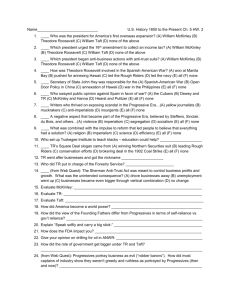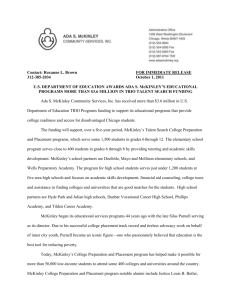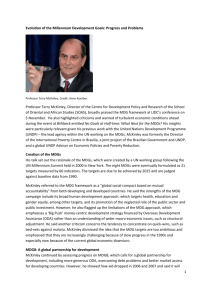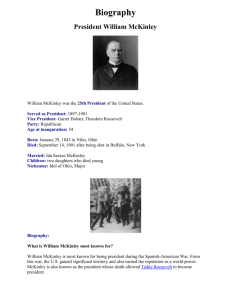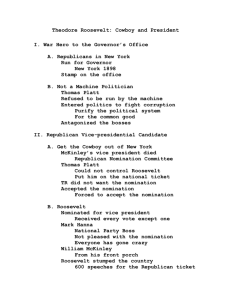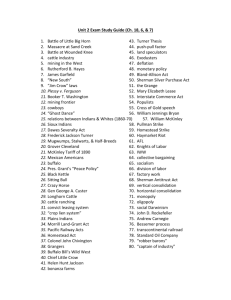William McKinley - The Man
advertisement
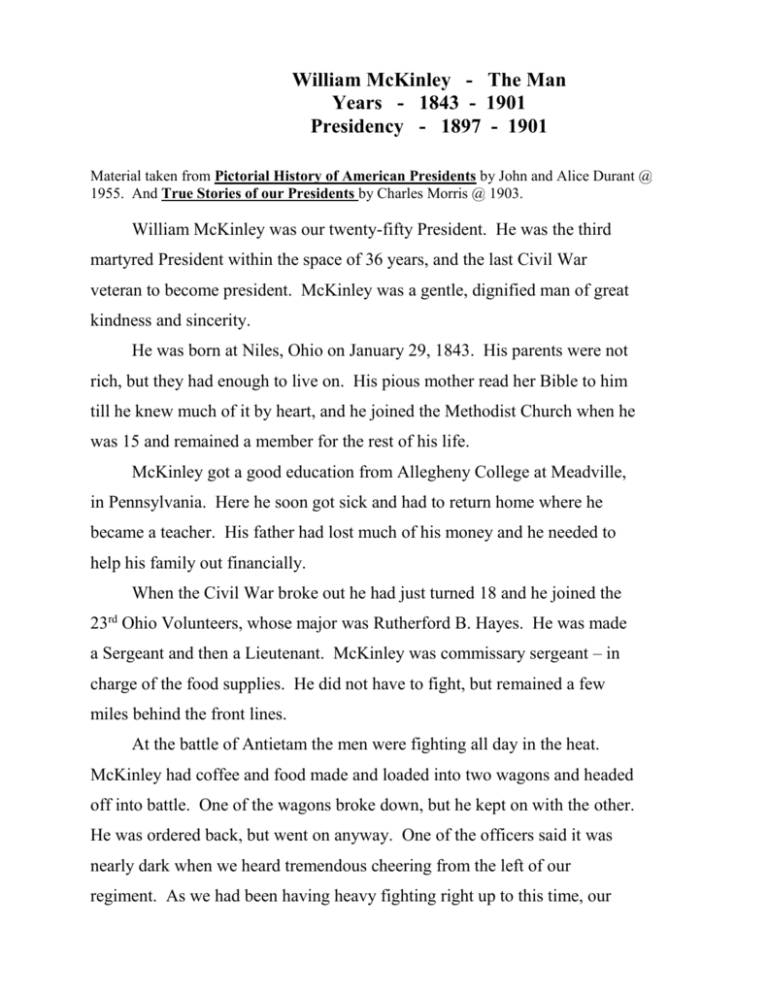
William McKinley - The Man Years - 1843 - 1901 Presidency - 1897 - 1901 Material taken from Pictorial History of American Presidents by John and Alice Durant @ 1955. And True Stories of our Presidents by Charles Morris @ 1903. William McKinley was our twenty-fifty President. He was the third martyred President within the space of 36 years, and the last Civil War veteran to become president. McKinley was a gentle, dignified man of great kindness and sincerity. He was born at Niles, Ohio on January 29, 1843. His parents were not rich, but they had enough to live on. His pious mother read her Bible to him till he knew much of it by heart, and he joined the Methodist Church when he was 15 and remained a member for the rest of his life. McKinley got a good education from Allegheny College at Meadville, in Pennsylvania. Here he soon got sick and had to return home where he became a teacher. His father had lost much of his money and he needed to help his family out financially. When the Civil War broke out he had just turned 18 and he joined the 23rd Ohio Volunteers, whose major was Rutherford B. Hayes. He was made a Sergeant and then a Lieutenant. McKinley was commissary sergeant – in charge of the food supplies. He did not have to fight, but remained a few miles behind the front lines. At the battle of Antietam the men were fighting all day in the heat. McKinley had coffee and food made and loaded into two wagons and headed off into battle. One of the wagons broke down, but he kept on with the other. He was ordered back, but went on anyway. One of the officers said it was nearly dark when we heard tremendous cheering from the left of our regiment. As we had been having heavy fighting right up to this time, our division commander, General Scammon, asked why. He soon found out they were cheering for McKinley and his hot coffee. When the Governor of Ohio heard about the coffee he made McKinley a lieutenant. In the Shenandoah Valley, in July, 1864, the Confederate General Early attacked General Crook and his men driving them back. General Hayes, his commander, ordered him to ride into the thick of the battle through a rain of shot and bursting shells, and brought out the regiment safely. This deed made him a Captain. After the war he studied law for two years and began a practice in Canton, Ohio. This would be his home for the rest of his life and where he would be buried. His first case was given to him by Judge Glidden, his law instructor. He dropped off the papers at McKinley’s office and said the case was to be heard the next day, but he had to leave town. McKinley stayed up all night preparing and won the case the next day. Judge Glidden gave him $25. for the case and McKinley protested that it was too much but Glidden said he had charged the man $100. for the case and was well able to afford to pay McKinley $25.00. McKinley married Ida Saxton, the pretty and well-educated daughter of a Canton banker in 1871. They were deeply in love. In 1876 he was elected to Congress and he remained there for fourteen years. In 1890 he was defeated for re-election and the next year he became Governor of Ohio. He was re-elected in 1893. In 1896 he was elected President of the United States. No more devoted couple than the McKinleys ever dwelt in the White House. When Ida Saxton married McKinley in 1871 she had every reason to look forward to a life of normal happiness. But within three years she lost her mother and two baby daughters. The calamities so shattered her nervous system that she developed epilepsy. For the rest of her life she could not tell from minute to minute when she would fall unconscious. With a patience and kindness rarely seen, McKinley shielded her, insisted that she go everywhere with him and responded to her every summons. When he was not working he took no recreation by remained at her side, trying to make her existence more livable. McKinley was re-elected by the Republican Party again in 1900. The President and his wife took a long journey that spring through the South and West, from Washington to San Francisco. In September he went to Buffalo, New York to attend the PanAmerican Exposition. McKinley always felt the President must be assessable to the people and a reception was held where people could file past the President and shake his hand. His secret service was very against this as they felt they could not adequately provide safety for him. On September 6, a young anarchist named Leon Czolgosz, who had a revolver concealed in a handkerchief, took his place in line. As he came face to face with McKinley he fired twice through the handkerchief. One bullet struck McKinley in the breastbone; the other ripped through his abdomen. “Let no one hurt him,” he gasped, as the guards rushed furiously at the murderer. As the wounded President was caught and supported by his aides, he whispered to his secretary, “My wife—be careful how you tell her—oh, be careful.” McKinley lived for eight days, then began to sink. His wife was brought in and wept bitterly as she begged the doctors to save him. “Good bye, all; good bye,” whispered the dying man. “It is God’s way. His will be done.” These were his last words. A few hours later he was dead. “I thought it would be a good thing for the country to kill the President.” Said Czolgosz in his cell. He was electrocuted 45 days after McKinley’s death.

